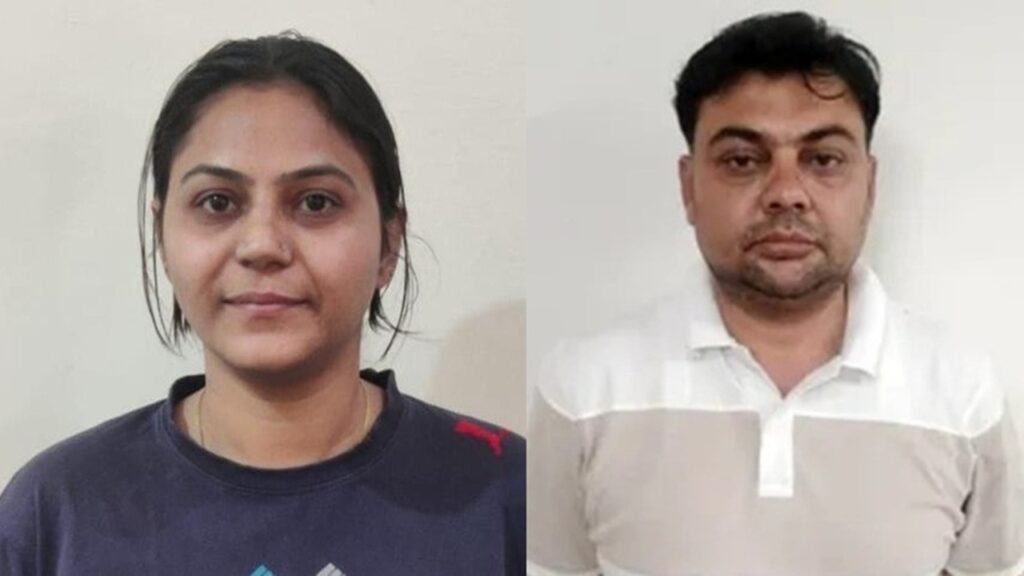Synopsis: UP ATS arrested Shehzad for spying for Pakistan’s ISI, while Haryana Police nabbed vlogger Jyoti Malhotra for sharing sensitive data. Both cases, tied to Operation Sindoor, expose rising espionage and spark concerns over declining nationalism in India.
New Delhi: The Uttar Pradesh Anti-Terrorism Squad (ATS) arrested Shehzad, a Rampur trader, on May 19, 2025, for spying for Pakistan’s Inter-Services Intelligence (ISI), funding agents, and sharing sensitive security details. Days earlier, on May 16, Haryana Police detained 33-year-old travel vlogger Jyoti Malhotra, aka Jyoti Rani, for leaking military information to ISI operatives during Operation Sindoor. Both face charges under the Official Secrets Act, 1923, and Section 152 of the Bharatiya Nyaya Sanhita (BNS), highlighting a surge in espionage amid India-Pakistan tensions.
Dual Arrests Expose ISI’s Covert Tactics
Shehzad, operating under the guise of smuggling cosmetics and spices, facilitated ISI operations by supplying funds and Indian SIM cards. “He was smuggling secrets, not just goods,” said ATS IG Nilabja Chaudhary. Similarly, Malhotra, a YouTuber with 377,000 subscribers, shared sensitive data with Ehsan-ur-Rahim, a Pakistan High Commission official expelled on May 13. Her visits to Pakistan, facilitated by ISI handlers, involved promoting Pakistan’s image while leaking military details. Both used encrypted platforms like WhatsApp to evade detection.
Official Secrets Act: India’s Anti-Espionage Shield
The Official Secrets Act, 1923, underpins both arrests. Section 3 penalizes spying, including sharing information useful to an enemy, with up to 14 years’ imprisonment, while Section 5 targets unauthorized disclosure of secrets. Malhotra’s charges stem from her communications with ISI operatives like Ali Ahwan, while Shehzad’s involve funding cross-border activities. “These cases show ISI’s sophisticated recruitment,” said Haryana SP Shashank Kumar Sawan, noting the arrests followed Operation Sindoor’s strikes on terror bases post the Pahalgam attack that killed 26 civilians.
Rising Treason Cases Stir Nationalism Debate
With 15 ISI-related arrests in 2024-2025 across Uttar Pradesh, Haryana, and Punjab, concerns about waning nationalism are mounting. “Financial lures and honeytraps exploit vulnerabilities,” said analyst Major General (Retd.) Dhruv Katoch. Shehzad claimed, “I was only trading goods,” while Malhotra’s father insisted, “She made travel videos with permission.” The cases, part of a broader crackdown nabbing six others, including students, reflect ISI’s use of diverse profiles, from traders to influencers, prompting questions about patriotic campaigns’ efficacy.
Convictions and Fairness Under Scrutiny
Government data from 2020-2024 records 40 convictions under the Official Secrets Act, but 10% of arrests were later deemed baseless due to weak evidence. “Overzealous charges risk injustice,” said advocate Prashant Bhushan. Shehzad’s digital logs and Malhotra’s financial discrepancies, showing ISI funding, strengthen the cases, yet public skepticism persists. Opposition leaders like Asaduddin Owaisi warn against “witch-hunts,” while BJP’s Sambit Patra hails the arrests as “safeguarding Bharat.” Social media, with posts like
@GallopingMo’s “Betrayal of Bharat,” reflects public outrage.
Operation Sindoor’s Broader Impact
Operation Sindoor, targeting terrorist sites in Pakistan and PoK, has intensified counterintelligence. “Modern warfare uses influencers for narratives,” said Hisar SP Sawan, noting Malhotra’s role in a network exploiting digital spaces. Shehzad’s visa arrangements via ISI handlers highlight porous borders as entry points. The crackdown, also questioning Odisha’s Priyanka Senapati, signals a nationwide sweep. Pakistan denies ISI involvement, calling it “India’s propaganda,” but recovered evidence, including Malhotra’s Lahore videos, suggests otherwise.
Conclusion: The arrests of Shehzad and Jyoti Malhotra expose ISI’s infiltration through traders and influencers, raising alarms about espionage and nationalism. While convictions rise, fair investigations are crucial to balance security and justice in India’s fight against covert threats.


